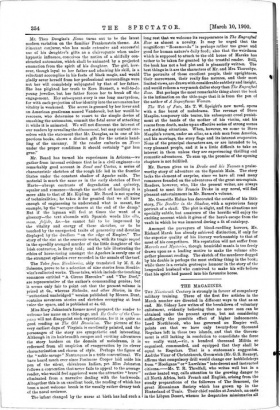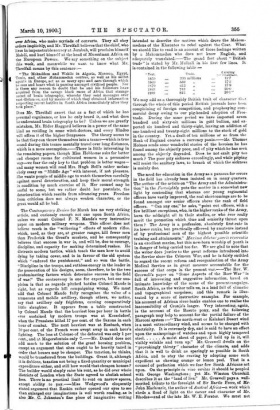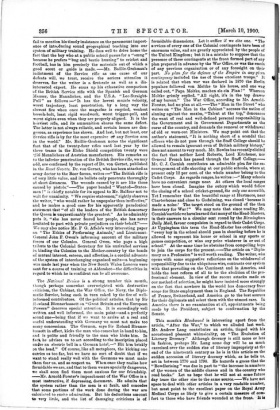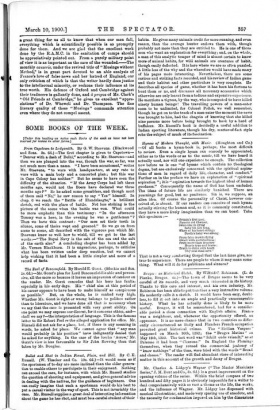THE MAGAZINES.
THE Nineteenth Century is strongly in favour of compulsory military training. Three of the first five articles in the March number are directed in different ways to that as an end. Mr. Sidney Low writes of the breakdown of voluntary enlistment, evidently believing that no more men can be obtained under the present system, but not considering sufficiently the possible effect of higher inducements. Lord Northbrook, who has governed an Empire well, points out that we have only twenty-four thousand Regulars left in these two islands, and that the Govern- ment is still lacking in resolution to consolidate the force we really want,—viz., a hundred thousand Militia so organised, commanded, and equipped that they shall be equal to Regulars. That is a statesman's suggestion. And the Vicar of Christchurch, Greenwich (Mr. G. S. Heaney), affirms that compulsory drill would change our hobbledehoys from " Hooligans " or" Larrikins " into decent and instructed citizens.—Mr. T. R. Threlfall, who writes well but in a rather heated way, calls attention to the growing danger to all North Africa, both French and English, arising from the steady preparations of the followers of The Senonssi, the great Mussulman Society which has grown up in the Hinterland of Tunis. Their chief resides at Jerabnb, an oasis in the Libyan Desert, whence he despatches missionaries all
over Africa, who make myriads of converts. They all obey orders implicitly, and Mr. Threlfall believes that the chief, who lives in impenetrable secrecy at Jerabub, will proclaim himself Mahal, and hurl himself at the head of Mussulman Africa on the European Powers. We say something on the subject this week, and meanwhile we want to know what Mr. Threlfall means by this sentence :—
" The Mokaddem and Wekils in Algeria, Morocco, Egypt, Tunis, and other Mohammedan centres, as well as his secret agents in Europe, act as so many eyes and ears through which be sees and hears what is passing amongst civilised people. Nor is there any reason to doubt that he and his followers have acquired from the savage black races of Africa that strange secret of brain telegraphy, whereby they send messages over vast distanees, and by means of which they obtained information respecting recent battles in South Africa immediately after they took place."
Does Mr. Threlfall assert that as a fact of which he has personal cognisance, or has he only heard it. and what does he understand brain telegraphy to be ? Unless we are greatly mistaken, Mr. Rider Haggard believes in a power of the same
Lind as residing in some witch-doctors, and every Hindoo will affirm it of the higher Sunyagees. The theory seems to be that they can throw themselves into a trance—which is true —and during this trance mentally travel over long distances, which is a mere assumption.—There is little interesting in the remaining papers, though Miss Hobhonse asks for better and cheaper rooms for cultivated women in a persuasive
way—we fear the only key to that problem is better wages— and many women will read Mrs. Hugh Bell's rather melan- choly essay on "Middle Age" with interest, if not pleasure.
She wants people of middle age to watch themselves carefully against moral deterioration, and keep their moral strength
in condition by much exercise of it. Her counsel may be useful to some, but we rather doubt her postulate, the
deterioration which results from advancing years. Freedom from criticism does not always weaken character, or the great would all be bad.
The Contemporary Review for March has no very striking article, and curiously enough not one upon South Africa, unless we count Colonel F. N. Mande's very instructive paper on modern military weapons. This officer does not believe much in the withering" effects of modern rifles. which, used, as they are, at greater ranges, kill fewer men than Frederick the Great's muskets, and he consequently believes that success in war is, and will be, due to courage, discipline, and capacity for making determined rushes. He distrusts modern tactics, which teach the men how to avoid dying by taking cover, and is in favour of the old system which "endured the punishment," and so won the battle. "Discipline in the troops, and ruthless energy in the leader in the prosecution of his designs, seem, therefore, to be the two predominating factors which determine success in the field of war." The controversy is one for experts, but our sus- picion is that as regards pitched battles Colonel Maude is tight, but as regards hill campaigning wrong. We must add that Colonel Maude fully recognises the value of a numerous and mobile artillery, though others, we notice, say that artillery only frightens, causing comparatively little slaughter. It appears from a table constructed by Colonel Maude that the heaviest loss per hour in battle ever sustained by modern troops was at Kesselsdorf, when the Prussians killed 17 per cent. of the Saxons in each hour of combat. The next heaviest was at Rosbach, when
10 per cent, of the French were swept away in each hour's fighting. The loss at Colenso of the defeated was only 1 per cent., and at Magersfontein only 1.—Mr. Donald does not
add much to the solution of the great housing problem, except an argument that sites ought to be heavily taxed in
order that houses may be cheaper. The taxation, he thinks, would be transferred from the buildings. Grant it, although it is dubious, taxation not being a fixed quantity or municipal expenditure either, and still how would that cheapen houses P The builder would simply raise his rent, as he did over whole districts of London when the State agreed to abolish school
fees. There is no practical limit to rent on narrow spaces, except ability to pay.—Mies Wedgwood's eloquently stated argument that Raskin rather opened our eyes to see than enlarged our imaginations is well worth reading, as is also Mr. C. Johnston's fine piece of imaginative writing intended to describe the motives which drove the Mahout- medans of the Khanates to rebel against the Czar. What we should like to read is an account of those feelings written by a Mahommedan who does not know English, and adequately translated.—The grand fact about "British trade" is stated by Mr. Mulhall in his first few lines. It is contained in the following table :-
Year. Trade. E. sterling r:-4- Inhabitant.
1859
•••
235 millions 11-7
180
•••
532 „ 172 1S79
612
ID
17-9
1SS9
743
• 3.
20'0 1899
04 •
815
20.1"
We may add as a thoroughly British trait of character 1.11.xt through the whole of this period British journals have been complaining of foreign competition, and prophesying com- mercial decay owing to our pig-headed adoption of Free. trade. During the same period we have imported seven hundred and sixty-sir millions in gold bullion, and ex- ported six hundred and thirty-eight, leaving an addition of one hundred and twenty-eight millions to the stock of gold in the country. Yet a draft of ten millions or so from the Bank of England creates a currency panic.—Mr. Thomas Holmes sends some wonderful stories of the heroism he has found among the abjectly poor, and of pity which he has seen among the abjectly degraded. Does he not exalt pity too much ? The poor pity sickness exceedingly, and while pitying will resist the sanitary laws, to breach of which the sickness is mainly due.
The need for education in the Army as a panacea for errors in the field has already been insisted on in many quarters. The author of the article on "The Army and the Administra- tion" in the Fortnightly puts the matter in a somewhat new light by contending that whereas our young regimental officers have vastly improved, the real shortcomings are to be found amongst our senior officers above the rank of field officers. "Can any one," he asks, "point out officers, with a few brilliant exceptions, who, in the higher ranks of the Army, burn the midnight oil in their studies, or who ever really merit the promotion which time and seniority thrust upon them ? The Army is a profession, absolutely first-rate in its lower ranks, but practically officered by amateurs instead of by professional men of the highest possible scientific training and attainments." Maxima debetur p2teris reverentia is an excellent maxim, but this new-born worship of youth is in danger of being carried too far. We are glad to note that the writer does justice to the great reforms introduced into the Service since the Crimean War, and be is fairly entitled to regard the recent reform and reorganisation of the Army Medical Service as in great measure accountable for the success of that corps in the present war.--The Rev. W. Greswell's paper on Some Aspects of the Boer War" is fall of interesting and suggestive information, based on intimate knowledge of the scene of the presenteampaign. South Africa, as the writer tells us, is a land full of climatic and topographical surprises; and this remark is illus- trated by a score of instructive examples. For example, his account of African river-banks enables one to realise the inaccessibility of Cronje's laager. Very interesting, again, is the account of the Basuto pony, and the following paragraph may help to account for the partial failure of the Marconi system :—" The north-west or Kalahari Desert wind is a most extraordinary wind, and seems to be charged with electricity. It is extremely dry, and is said to have an effect upon the mainsprings of watches and upon highly tempered steel A moist sheet of paper, if held up in it, will visibly wrinkle and turn up." Mr. Greswell dwells on the "provokingly thirsty" character of the climate, and adds that it is well to drink as sparingly as possible in South Africa, and to stay the craving by adopting some such expedient as chewing orange or lemon peel. That is a counsel of perfection which we fear few South Africans act upon. On the principle in vino veritas it should be peopled with George Washingtons ; yet Mr. Winston Churchill describes it as the "land of lies." Mr. Greswell pays a well. merited tribute to the foresight of Sir Bartle Frere, of Mr. John Mackenzie, the author of Austral Africa—a work which sheds a flood of light on the career and character of Mr. Rhodes—and of the late Mr. W. E. Forster. We must not fail to mention his timely insistence on the paramount import- ance of introducing sound geographical teaching into our gyatem of military training. He does well to drive home the fact that the boy who at a public school passes for a " smug " because he prefers "bug and beetle hunting" to cricket and football, has in him precisely the materials out of which a good scout or guide is made. —Mr. Baillie-Grohman's indictment of the Service rifle as one cause of our defeats will, we trust, receive the serious attention it deserves, for the writer is a first-rate as well as a dis- interested expert. He sums up his exhaustive comparison of the British Service rifle with the Spanish and German Mauser, the Mannlicher, and the U.S.A. " Lee-Straight- Pull " as follows :—" It has the lowest muzzle velocity, worst trajectory, least penetration, by a long way the slowest fire when once the magazine is emptied, weakest breech-bolt, least rigid woodwork, worst trigger-pull, and worst eights even when they are properly aligned. It is the heaviest rifle, and its ammunition shares the same defect. The latter is not always reliable, and certain issues are dan- gerous, as experience has shown. And last, but not least, our Service rifle is by far the most expensive eel any Service arm in the world." Mr. Baillie-Grohman notes the significant fact that of the twenty-four rifles used last year by the three teams in the Elcho Shield competition twenty were -256 lilannlichers of Austrian manufacture. His remarks as to the inferior penetration of the British Service rifle, we may add, are confirmed by the report of Dr. von Gernet, published in the Revel Gazette. Dr. von Gernet, who has been attached as army doctor to the Boer forces, writes :—" The British rifle is of very little value, and its bullets only penetrate thoroughly at short distances. The wounds caused by it are like those caused by pistols."—The paper headed " Wanted—States- men !" is chiefly notable for its appeal to Mr. Balfour not to wait for unanimity. "We require statesmen," rightly observes the writer, "who would rather be unpopular than ineffective," and. he makes a good case for his apparently paradoxical statement that "of all the leaders of the British democracy the Queen in unquestionably the greatest." As he admirably puts it, "she has never feared her people, she has never hesitated to part with private prejudices on their behalf."— We may also notice Mr. F G. Afla1o's very interesting paper on "The Ethics of Performing Animals," and Lieutenant- General John F. Owen's informing account of the military forces of our Colonies. General Owen, who pays a high tribute to the Colonial Secretary for his unrivalled services in binding the Colonies to the Mother-country by the bonds of mutual interest, esteem, and affection, is a cordial advocate of the system of interchanging organised units—a beginning was made last year when the New South Wales Lancers were sent for a course of training at Aldershot—the difficulties in regard to which he is confident can be all overcome.
The National Review is a strong number this month, though perhaps somewhat overweighted with destructive eriticism, the Cabinet, the War Office, the Navy, the Diplo- matic Service, being each in turn raked by the fire of well- informed contributors. Of the political articles, that by Sir Rowland Blennerhassett on "Great Britain and the European Powers" deserves special attention. It is exceedingly well written and well informed, the main point—and a perfectly sound one—being that if we want to arrive at a real and useful understanding with Germany we must not make too many concessions. The German, says Sir Roland Blenner- hassett in effect, kicks the man who comes hat in hand to him, and is polite and friendly to the man who kicks him. In fact, he advises us to act according to the inscription placed under an electric bell in a German hotel,—" Hit him briskly on the head." Of course, like all metaphors, the kicking one carries us too far, but we have no sort of doubt that if we want to stand really well with the Germans we must make them fear us, and so respect us. When once they realise how formidable we are, and that to them we are specially dangerous, we shall soon find them most anxious for our friendship. —Mr. Arnold-Forster's impeachment of the War Office is a most instructive, if depressing, document. He admits that the system rather than the men is at fault, and concedes that some portions of the work done during the war are calculated to excite admiration. But his deductions amount to very little, and the list of damaging criticisms is of
formidable dimensions. Let it suffice if we cite one. "The services of every one of the Colonial contingents have been of enormous valise, and are greatly appreciated by the people of the United Kingdom ; but it is a mistake to suppose that the presence of these contingents at the front formed part of any plan prepared in advance by the War Office, or was the result of any previous organisation or of any foresight on their part. No plan for the defence of the Empire in any given contingency included the use of these excellent troops." It is related that when war was declared in 1870 the Berlin populace followed von Moltke to his house, and one wag called out, "Papa Moltke, machen ale em n Plan !" Whereon Moltke grimly replied, "All right, it's in the top drawer of my bureau." The War Office, according to Mr. Arnold. Forster, had no plan at all.—The" Man in the Street" who writes on "The Man in the Cabinet" accuses the nation of sinning against the maxim, "Talent at the top," denounces the want of real and well-defined personal responsibility in the Government and in Government Departments as the curse of the country, and demands the removal or withdrawal of old or worn-out Ministers. We may point out that the author's statement, "It is nothing short of a scandal that officers who do not pass through the Staff College should be allowed to remain ignorant even of British military history," does not amount to very much. Mr. Bowles has recentlyelicited the fact that neither Lord Roberts, Lord Kitchener, nor General French has passed through the Staff College. Mr. C. J. Cornish contributes an admirable plea for the en- couragement of rifle shooting at our public schools, where at present only 12 per cent. of the whole number belong to the Cadet Corps. As regards ranges, he writes :—" Many schools have no convenient range near. At others the local ranges have been closed. Imagine the outcry which would follow the closing of a school cricket-ground, the only one accessible. Yet I remember that the beautiful range at Hurtmore, near Charterhouse and close to Godalming, was closed because it made a noise.' The target stood on the ground of the then Secretary for War!" We may note that since reading Mr. Cornish's article we have learned that many of the Head-Masters, in their answers to a circular sent round by the Birmingham Daily Mail, favour compulsion in regard to their Cadet Corps. At Uppingham this term the Head-Master has ordered that "every boy in the school should pass in shooting before he is allowed to represent his house or school in any sports or games competition, or wine any prize whatever in or out of school." At the same time he abstains from compelling boys to join the corps for the present.—The article on "Diplo- macy as a Profession" is well worth reading. The writer, who opens with some suggestive reflections on the withdrawal of responsibility due to the ubiquitous wire, contrasts our system with that prevailing on the Continent and in America, and holds the best reform of all to be the abolition of the pro- fessional element. In view of the recent attacks made on our method of selection, he might have insisted more strongly on the fact that nowhere in the world has democracy freer scope for State employment than in England. The Republics of France, Switzerland, and America go to the best sources for their diplomats and select them with the utmost care. In America there is no examination at all, appointments being made by the President, subject to confirmation by the Senate.
This month's Blackwood is interesting apart from the article, "After the War," to which we alluded last week.- Mr. Andrew Lang contributes an article, tinged with his accustomed pleasant whimsicality, on "The Evolution of Literary Decency." Although decency is still more or less in fashion, perhaps Mr. Lang some day will be as much exercised over the sudden rise of literary impropriety at the end of the nineteenth century as he is in this article on the sudden accession of literary decency which, as he tells us, set in between 1770 and 1790. He hazards a guess that the " Bowdlerising " was due in part to "the increase in numbers of the women of the middle classes and in the country who read books." Let us hope that he will not at some future day trace the other rise to the same sottrce.—We have not space to deal with other articles in a very readable number, but must point to the excellent paper on the Royal Army Medical Corps as likely to give a certain measure of com- fort to those who have friends wounded at the front. It is a great thing for us all to know that when our men fall, everything which is scientifically possible is so promptly done for them. And we are glad that the excellent work done by the R.A.M.C. in the sanitation of camps should be appreciatively pointed out. From a purely military point of view it is as important as the care of the wounded.—The monthly causerie, under the revived title of "Musings without Method," is in great part devoted to an able analysis of France's love of false news and her hatred of England, our only criticism of which is that the writer hardly does justice to the intellectual minority, or reckons their influence at its true worth. His defence of Oxford and Cambridge against their traducers is gallantly done, and a propos of Mr. Clark's "Old Friends at Cambridge," he gives us excellent "appre- ciations" of Dr. Whewell and Dr. Thompson. The fine literary quality of these " Musings " commands attention even where they do not compel assent.









































 Previous page
Previous page